Thank you very much to everyone who has wished us a Happy Birthday over the last week or two – in person, on Facebook or by email. Your kind wishes and comments are so thoughtful and have really made us feel special. Thank you to you all!
Happy Birthday Hollybank!
On 2nd March Hollybank turns ten years old! A great deal has changed since we first opened the doors back in 2009. As an independent practice we started from scratch and on that very first day we did not know if we would have any clients when opened the doors! But we did! And many of the patients and clients we saw that very first week are still visiting us now.
We saw a few appointments that very first day and a few more the day after that. From there, through word of mouth and trying our best to provide an excellent service for all, the practice has grown from strength to strength.
When we first opened our doors we had just four members of staff – and by the end of 2009 we were down to three. This did mean long hours but we were determined the practice would be a success and by April 2010 we employed our first receptionists. Now we have a reception/administration team of four, eight registered veterinary nurses and six vets!
We achieved our hospital status just seven months after we opened in October 2009 and have since been re-accredited twice, to ensure that meet the highest of standards the Royal College of Veterinary Surgeons sets for first opinion practice. We are also now a nurse training practice and our four nurse clinical coaches teach and train two student vet nurse students each year.
Since the very beginning we have done our own emergency and out of hours work and we are committed to making sure that is always the case. We have now expanded our out of hours service to clients from some neighbouring practices too.
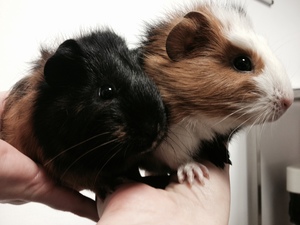
Not long after we opened we got our guinea pigs, Stacey and Nessa. They toured around many schools, open days and cub packs and were loved by us all. Sadly they have both passed away now and we have two beautiful rose bushes to remember them by. Our two new girls, Marmalade and Marmite, have carried on the tradition and can often be found in their fancy run enjoying the grass.
It has been our pleasure to look after our patients and their owners for the last ten years. Richard and I could sit for hours reminiscing about the characters we have met along the way – the sad times, the happy times, the ‘I can’t believe he ate that’ times and all those people and pets who have become part of our lives, some for just a short time and some for many years. As the very first puppies and kittens we met as Hollybank vets now turn ten themselves, we realise we have cared for some pets for their whole lives. To us, that is a privilege, the reason why we do this job and why Hollybank is Hollybank. Here’s to the next ten years!
Brave Pet of the Month…Gwen
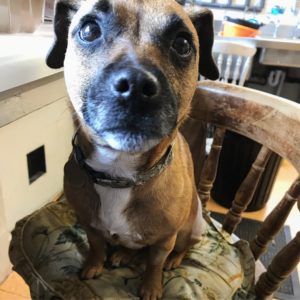 Gorgeous Gwen was suffering from recurrent lameness in her left hind. As she was such a brave sweet girl it was very hard initially to localise where she was painful. She seemed to respond to rest and pain relief so we persevered with this. However, with time, the lameness recurred more frequently and Gwen became harder to keep comfy.
Gorgeous Gwen was suffering from recurrent lameness in her left hind. As she was such a brave sweet girl it was very hard initially to localise where she was painful. She seemed to respond to rest and pain relief so we persevered with this. However, with time, the lameness recurred more frequently and Gwen became harder to keep comfy.
As the frequency and severity of Gwen’s lameness progressed it became more obvious that Gwen was painful in her left hip. Given her history and relatively young age we decided it was best to take some x-rays in case there was something more specific we could be doing. It is also helpful to re-examine patients when they are more relaxed; this is sometimes the only time we can feel an unstable knee or a luxating knee cap. These were both potential differential diagnoses or complicating factors we wanted to rule in or out for Gwen.
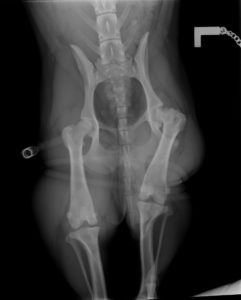 Gwen’s X-rays revealed a severely abnormal left hip joint. This may be related to abnormal development and can be referred to as hip dysplasia. Young small dogs can also suffer from a type of developmental disease called Legg-calve-perthe’s disease; this is where poor blood supply to the ball of the joint results in degeneration of the cartilage and bone. With any abnormal joint there is a risk of secondary osteoarthritis which was evident by the uneven and bumpy surface of her ball and socket joint.
Gwen’s X-rays revealed a severely abnormal left hip joint. This may be related to abnormal development and can be referred to as hip dysplasia. Young small dogs can also suffer from a type of developmental disease called Legg-calve-perthe’s disease; this is where poor blood supply to the ball of the joint results in degeneration of the cartilage and bone. With any abnormal joint there is a risk of secondary osteoarthritis which was evident by the uneven and bumpy surface of her ball and socket joint.
Regardless of the exact cause, in such cases where pain cannot be adequately managed with oral pain relief we choose to perform a surgery to give a better quality of life. We decided this was the case for Gwen.
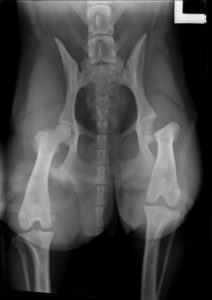 The surgery is called a femoral head and neck excision. This involves removing the abnormal ball of the hip’s ball and socket joint so that the remaining flat end can fuse with the hip joint. Although the joint will never function as a ‘normal’ joint and cannot have the same range of motion, the joint is no longer painful and so allows a significantly better long term outcome. The post op radiographs hopefully make this procedure clearer.
The surgery is called a femoral head and neck excision. This involves removing the abnormal ball of the hip’s ball and socket joint so that the remaining flat end can fuse with the hip joint. Although the joint will never function as a ‘normal’ joint and cannot have the same range of motion, the joint is no longer painful and so allows a significantly better long term outcome. The post op radiographs hopefully make this procedure clearer.
The ‘new joint’ is stabilised by the development of new fibrous tissue, a process which her own body will take care of itself. However, in order to encourage appropriate fibrous connections and mobility, early and controlled return to exercise is needed. Physiotherapy and hydrotherapy are also carefully utilised.
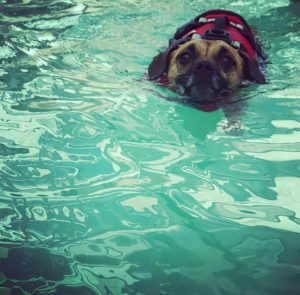 Leonie, one of our registered veterinary nurses led Gwen’s physiotherapy sessions checking up on her weekly to ensure the right progress was being made. Gwen’s lovely owner was dedicated and took her to hydrotherapy lessons too. Not being a swimmer, Gwen actually really took to and loved her hydrotherapy!
Leonie, one of our registered veterinary nurses led Gwen’s physiotherapy sessions checking up on her weekly to ensure the right progress was being made. Gwen’s lovely owner was dedicated and took her to hydrotherapy lessons too. Not being a swimmer, Gwen actually really took to and loved her hydrotherapy!
Gwen’s recovery took time but she did brilliantly, she was a happy and comfy little girl and we managed to completely stop all pain relief.
Recently she has had a little flare up of lameness in that leg. Inevitably she will be at risk of future osteoarthritis and she may well upset the joint intermittently being a bouncy young terrier! We can manage the leg with pain relief again as and when we need to but at least Gwen has been given the best opportunity to keep that limb pain free and manageable for as long as possible.


